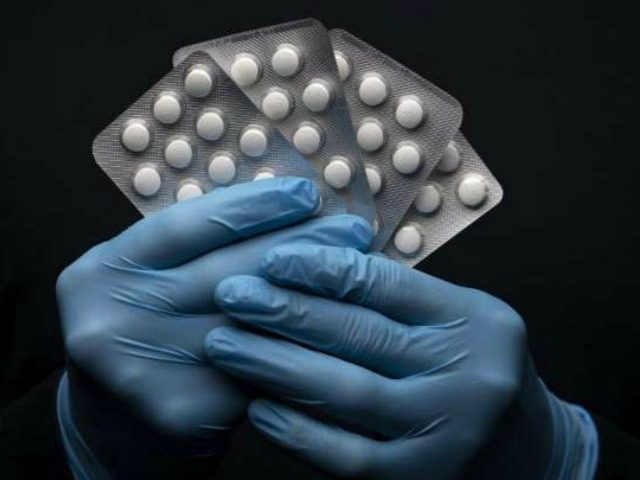President Donald Trump persuaded India’s prime minister to release many millions of hydroxychloroquine pills on April 6 after the Indian government had announced it would keep all of the pills for its own population of almost 1.5 billion people.
“I called Prime Minister Modi of India this morning … and I said I’d appreciate it if they would release the amounts that we ordered,” Trump told reporters April 4, adding:
They make large amounts of hydroxychloroquine — very large amounts, frankly. They had a hold [on exports], because, you know, they have 1.5. billion people, and they think a lot of it. And I said I’d appreciate it if they would release the amounts that we ordered …
But we have already 29 million [dosesin stock]. That’s a big number. Twenty-nine million doses. And we’ve got millions of doses that are being made here and many millions of doses that are made elsewhere that are being shipped here, and it will be arriving…
But there’s a lot of very positive things happening with that. That’s a game changer if that’s the case. Obviously, we continue to work on the vaccines, but the vaccines have to be down the road by probably 14, 15, 16 months.
Many doctors say their coronavirus patients do improve after being treated with hydroxychloroquine.
On April 6, India’s government decided to allow exports of the pills to the United States.
India’s media added more details about the Trump deal. LiveMint.com, an Indian business website, reported April 6:
NEW DELHI: Paying heed to US President Donald Trump’s call, India on Monday decided to allow export of hydroxychloroquine — a drug seen as key in the treatment of the covid-19 pandemic — on a “case by case” basis. It also allowed the export of paracetamol, a popular antipyretic, as well as some more drugs.
The decision follows a telephone conversation between Trump and Prime Minister Narendra Modi on Saturday. Besides the US, a number of other countries also have approached India to export hydroxychloroquine. Nearly half of US’s supply of the drug, which as such is prescribed against malaria, comes from India.
….
Two government officials familiar with the matter said that the Committee of Secretaries headed by Cabinet secretary Rajiv Gauba gave its green signal to the lifting of the ban – albeit with certain conditions attached. These were domestic availability and sufficient stocks of the drugs for people at home, the situation in the covid-19-affected country and India’s ties with countries to which the drugs will be exported to, one of two officials cited above said.
The U.S. supply may initially be diverted from Africa’s routine consumption of the anti-malaria drug. The Wall Steet Journal reported April 7:
The normal domestic consumption of the drug in India is pegged at around 24 million tablets a year. Until now India has been largely exporting the drug to African nations that struggle with malaria. Zydus Cadila, Wallace Pharmaceuticals, Ipca Laboratories and Cipla are among the top Indian producers of the medicine, which is also used to treat rheumatoid arthritis and lupus.
Overall, U.S. investors and CEOs have shifted the U.S. production of Americans’ pharmaceuticals to China and Indian, so leaving Americans vulnerable to Chinese government policy amid the spread of China’s Wuhan virus. The WSJ reported March 1:
The [U.S.] Food and Drug Administration said Thursday [February 27] a drug has gone into shortage because of difficulties obtaining an ingredient from a site affected by the coronavirus. It didn’t disclose which drug or its manufacturer.
How much multinational drugmakers depend on China-sourced ingredients is unclear. Policy makers often cite a figure that 80% of drug materials are imported overseas, but the FDA said it can’t track how much is from China.
Even India’s pharmaceutical industry relies on critical supplies from China, according to the March 1 WSJ article:
Some Chinese firms stopped shipping to manufacturers in India because of the outbreak, the Journal has reported. The Indian generic-drug industry, which the FDA says supplies 40% of U.S. generic drugs, relies on China for much of its active ingredients.
Indian nationalists also speculated about the likely price that Trump paid to secure the hydroxychloroquine deliveries:
USA wants #hydroxychloriquine urgently from India
India Govt in return asked
➡️Unrestricted Access to USA market for its Pharma companies
➡️Lift all bans levied by US FDA
➡️FDA will not harass Indian Pharma companies henceforthUSA accepted all demands in 24 hours
— Rishi Bagree 🇳 (@rishibagree) April 7, 2020
Currently, Trump’s deputies are dealing with Indian and U.S. companies who are lobbying for government help to keep roughly one million Indian visa workers in U.S. jobs. The agency has declined to provide answers to Breitbart News about the H1-B visa lobbying and possible U.S. concessions.
Corp. lawyers hid H-1B program in complexity – but never foresaw a virus would shutter myriad offices.
So now NASSCOM wants Trump's deputies to help them keep 100Ks of #H1B on the right side of DoL's fake-it-or-leave 'LCA' rules.
All before Nov. 2020. https://t.co/qe1RLSScuh— Neil Munro (@NeilMunroDC) April 4, 2020

COMMENTS
Please let us know if you're having issues with commenting.